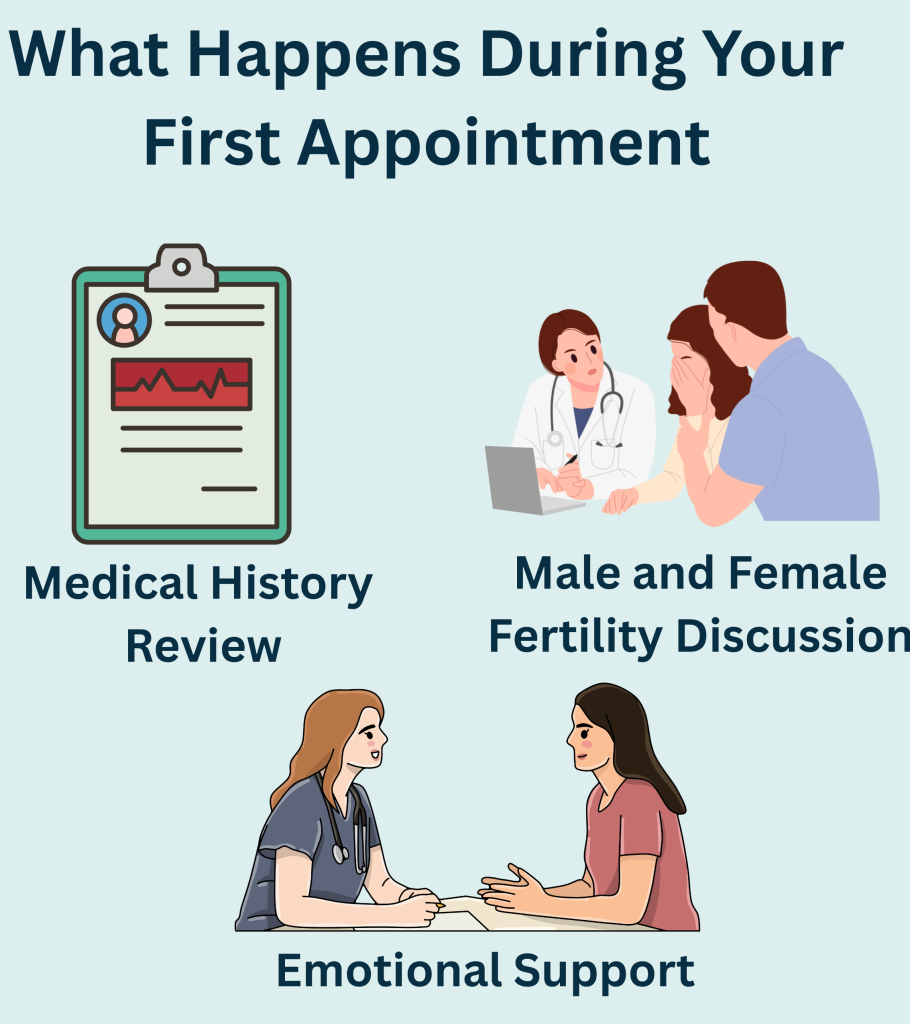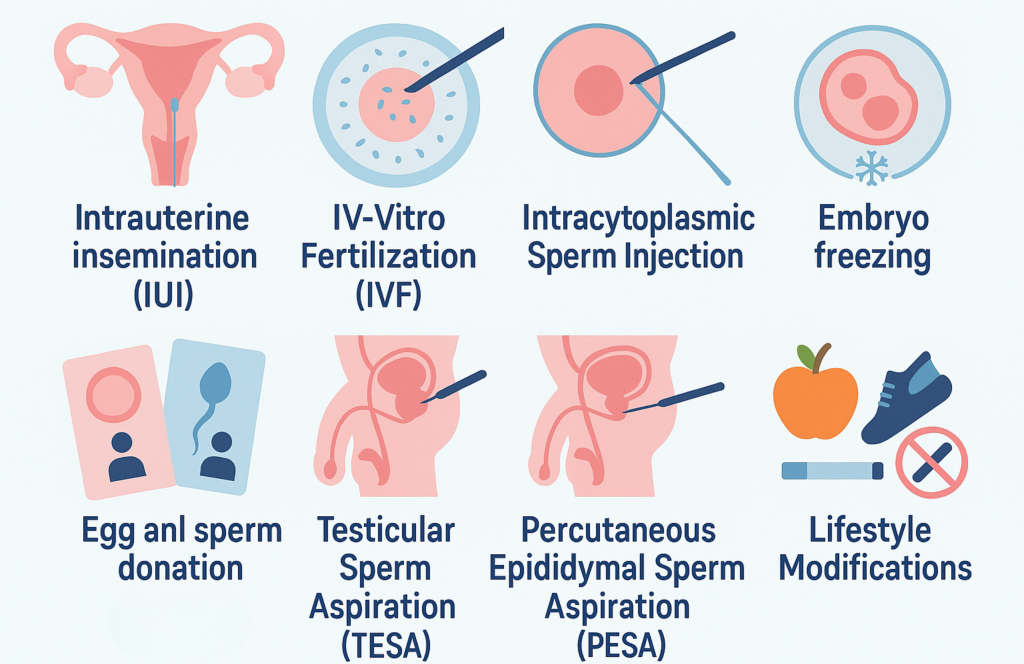What to Expect at Lakshmi Fertility Centre on Your First Visit
Visiting a fertility clinic for the first time can be an emotional and life-changing experience. If you are considering fertility treatment or struggling with infertility, your first visit is a crucial step toward your goal of parenthood. At Lakshmi Fertility Centre in Karaikudi, we understand the challenges you face and are committed to providing compassionate care with advanced medical treatments.
This article explains what you can expect during your first consultation at our clinic, including diagnostic tests, treatment options, emotional support, and lifestyle advice to help you on your fertility journey. By understanding the process, you’ll feel more confident and prepared as you take the first step towards building your family.
The Importance of Fertility Clinics: Why Your First Visit Matters
Infertility affects approximately 15% of couples worldwide, according to the World Health Organization (WHO). For many couples, fertility clinics offer the hope and support needed to conceive. Advances in Assisted Reproductive Technologies (ART), such as In-Vitro Fertilization (IVF) and Intrauterine Insemination (IUI), have revolutionized infertility treatment, helping millions of couples achieve their dream of parenthood.
At Lakshmi Fertility Centre, we offer personalized care to couples in Karaikudi who are facing a range of fertility challenges. We are equipped with state-of-the-art technology and a team of skilled professionals committed to improving your chances of conceiving.
The first visit to a fertility clinic is essential for understanding the factors affecting your fertility and developing a treatment plan tailored to your unique needs. The fertility specialist will work closely with you to gather vital information, review your medical history and discuss potential treatment options.
Initial Consultation: What Happens During Your First Appointment

Your first consultation at Lakshmi Fertility Centre will typically last between 30 minutes to 1 hour, depending on the complexity of your case. During this visit, the fertility doctor will review your medical history, discuss any symptoms you’re experiencing and ask about your reproductive health.
Medical History Review
The fertility doctor will ask questions about your overall health, lifestyle, previous pregnancies (if any), and menstrual cycle. It’s essential to discuss your medical conditions, any past surgeries, and lifestyle habits such as smoking, alcohol use, and weight, as these factors significantly impact fertility.
Research by the National Institutes of Health (NIH) suggests that maintaining a healthy weight, avoiding alcohol and tobacco, and managing stress can positively impact fertility.
Male and Female Fertility Discussion
Both partners should attend the first appointment. Infertility can be caused by either male or female factors, and understanding both is crucial. If male infertility is suspected, a semen analysis is typically recommended. For women, the fertility doctor will ask about the menstrual cycle and ovulation patterns.
Did you know? According to the American Society for Reproductive Medicine (ASRM), male infertility is responsible for approximately 40-50% of infertility cases.
Emotional Support
At Lakshmi Fertility Centre, we understand the emotional toll infertility can take. Our team provides counseling services to support you through the emotional ups and downs of the fertility journey. Stress, anxiety and emotional well-being are important aspects of your treatment plan.
Diagnostic Testing: What to Expect
After the initial consultation, your fertility specialist may recommend diagnostic tests to evaluate the underlying causes of infertility. These tests will help guide treatment decisions and ensure that you receive the most effective care possible.
For Women:
- Blood Tests: Blood tests measure hormone levels such as FSH, LH, and progesterone to assess ovulation and overall reproductive health. Abnormal hormone levels could indicate Polycystic Ovary Syndrome (PCOS), premature ovarian failure or other fertility-related conditions.
- Ultrasound: A transvaginal ultrasound will be performed to examine the ovaries, uterus and fallopian tubes for conditions like fibroids, endometriosis or blocked fallopian tubes.
- Hysterosalpingography (HSG): This procedure involves injecting a contrast dye through the cervix to check for blockages or abnormalities in the fallopian tubes. It helps identify issues that may affect fertility.
For Men:
- Semen Analysis: This is the primary test for male fertility. It assesses sperm count, motility (movement) and morphology (shape). Abnormal results may indicate conditions like low sperm count or poor sperm quality.
- Hormonal Tests: Hormonal imbalances, such as low testosterone, can also affect male fertility. Blood tests can determine if imbalances are contributing to infertility.
Treatment Options: Customized to Your Needs

At Lakshmi Fertility Centre, we offer a range of personalized fertility treatments designed to suit your specific needs. These treatments are based on your diagnostic results, fertility challenges and overall health. Here are the common options available:
Intrauterine Insemination (IUI)
IUI involves placing sperm directly into the uterus around ovulation, helping sperm reach the egg more effectively. This is commonly used for male infertility, cervical issues or unexplained infertility. It’s a non-invasive, low-cost option with a success rate of 10-20% per cycle.
In-Vitro Fertilization (IVF)
IVF involves extracting eggs from the ovaries, fertilizing them outside the body, and transferring embryos into the uterus. IVF is recommended for conditions like blocked fallopian tubes, severe male infertility or advanced maternal age. The success rate of IVF is about 40-45% for women under 35.
Intracytoplasmic Sperm Injection (ICSI)
ICSI is an advanced form of IVF where a single sperm is directly injected into an egg to achieve fertilization. This is often used in cases of severe male infertility, where sperm quality is compromised. ICSI ensures that even if sperm count or motility is low, fertilization can still be successful.
Embryo Freezing
Embryo freezing (or cryopreservation) allows for the freezing of viable embryos for future use. It’s often recommended for women who wish to delay pregnancy or for those undergoing IVF but have surplus high-quality embryos. This process gives couples the option of having more children later without the need for a full IVF cycle again.
Egg and Sperm Donation
Egg or sperm donation is a solution for individuals with poor egg quality or severe male infertility. Donors are thoroughly screened for health and the donated eggs or sperm are then used for fertilization and embryo transfer.
Testicular Sperm Aspiration (TESA)
TESA is a procedure for retrieving sperm directly from the testes in cases where there is no sperm in the semen. It’s typically used for men with conditions like azoospermia (absence of sperm in the ejaculate). The sperm retrieved can be used for ICSI in IVF.
Percutaneous Epididymal Sperm Aspiration (PESA)
PESA is a similar procedure to TESA but involves retrieving sperm from the epididymis, a tube where sperm mature. PESA is used for men with obstructive azoospermia, where sperm cannot travel through the vas deferens but are still present in the epididymis. Like TESA, the sperm is used for ICSI in IVF.
Lifestyle Modifications
Alongside medical treatments, adopting a healthy lifestyle is crucial. Dietary changes, exercise, stress management and avoiding smoking and excessive alcohol can significantly improve fertility. Studies from Harvard Health Publishing show that maintaining a healthy weight and reducing stress can boost fertility and improve treatment outcomes.
Costs and Financial Considerations
Lakshmi Fertility Centre provides transparent pricing, financing options and guidance on insurance coverage for fertility treatments. Many insurance plans now cover IVF and other treatments, but it’s important to check with your insurance provider to confirm details.
Success Rates: Optimizing Your Chances of Success
One of the most important factors when choosing a fertility clinic is its success rates. At Lakshmi Fertility Centre, we are proud of our high success rates in helping couples achieve their goals of parenthood. While success rates can vary based on age, health and other factors, we provide personalized care that improves your chances of success.
According to the Centers for Disease Control and Prevention (CDC), IVF success rates are higher for women under 35, with success rates ranging from 40-45% for this age group.
Frequently Asked Questions (FAQ)
1. What should I bring to my first appointment?
Bring your medical records, test results and a list of current medications.
2. How long does fertility treatment take?
Treatment durations vary. IUI may take 3-6 cycles, while IVF can take several months.
3. What are the costs?
Fertility treatment costs depend on the type of treatment and cycles required. Lakshmi Fertility Centre offers clear pricing and financing options.
4. Can lifestyle changes help improve fertility?
Yes, maintaining a healthy weight, reducing alcohol intake, quitting smoking and managing stress can positively affect fertility.
5. What are the success rates for IUI?
Success rates for IUI depend on age, health and other factors, but are generally 15-20% per cycle.
6. When should I consider IVF over IUI?
IVF is often recommended when there are blockages, severe male infertility, or other complex issues. IUI may be preferred for less severe cases.
Conclusion: Starting Your Fertility Journey with Confidence
Your first visit to Lakshmi Fertility Centre is an important step in your journey to parenthood. With our expert team, personalized care and advanced treatment options, we are here to support you every step of the way. Whether you need diagnostic testing, fertility treatments or emotional support, we’re committed to helping you achieve your dream of becoming a parent.
Schedule your consultation today and take the first step toward a brighter future.
